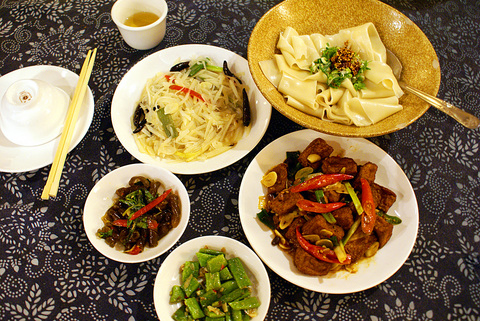Under its most infamous ruler Qin Shi Huang (秦始皇), the Qin Dynasty (秦朝) was a time marked by the centralization of government and codification of laws. According to Lin Hui-lin (林惠玲), owner of Qin Wei Guang, it was also a time when the emperor systematically categorized the history and ingredients of many dishes from the region that is today called Shaanxi Province (陝西).
Lin tells this and a bevy of other stories as she explains the origins and uses of the tapestries adorning the celebrity-signed walls, the patterns on the tablecloths covering the hardwood tables and the dishes on the menu. Even the corn, red peppers and garlic hanging out front of the restaurant serve as the foundation for a story about differing weather conditions between steamy Taipei and temperate Xian (西安), Shaanxi's capital city. It's this attention to detail that has made Qin Wei Guan a staple on many a gourmand's list of eateries to frequent.
The food Lin serves is as hearty as her stories. As Shaanxi cuisine is influenced by the numerous Muslims living in the area, the menu consists mainly of beef, lamb, broad-cut noodles and paomo — a broth stewed for a day and served with un-leavened bread. To accommodate local palettes, Lin has added fish, pork, and tofu to the menu.

PHOTO COURTESY OF YULI KIM
We started off with Hu Pi Hui (NT$160) — a mixture of green pepper, fried tofu and hot bean sauce — and cut broad noodles (NT$90). Cut broad noodles are a staple of Shaanxi and ours were served in a large bowl with chopped green onions and Lin's special chili paste, which, when mixed together, was simple but delicious.
For the main course we ordered Zhi Zi Gu Pai, or spareribs/spices (NT$360), a dish that is marinated, steamed, fried and baked before being brought to the table. The outer skin is crispy with the meat inside moist and succulent.
Halfway through our meal two dessert pastries arrived at our table. After a minute, one of the servers noticed that the delicate desserts were getting cold and told us to eat them. Only later did Lin tell us that it is the custom to eat dessert halfway through dinner.
"The sugary dessert helps with digestion and increases the appetite so that more food can be eaten," Lin said.

Cheng Ching-hsiang (鄭青祥) turned a small triangle of concrete jammed between two old shops into a cool little bar called 9dimension. In front of the shop, a steampunk-like structure was welded by himself to serve as a booth where he prepares cocktails. “Yancheng used to be just old people,” he says, “but now young people are coming and creating the New Yancheng.” Around the corner, Yu Hsiu-jao (饒毓琇), opened Tiny Cafe. True to its name, it is the size of a cupboard and serves cold-brewed coffee. “Small shops are so special and have personality,” she says, “people come to Yancheng to find such treasures.” She

In July of 1995, a group of local DJs began posting an event flyer around Taipei. It was cheaply photocopied and nearly all in English, with a hand-drawn map on the back and, on the front, a big red hand print alongside one prominent line of text, “Finally… THE PARTY.” The map led to a remote floodplain in Taipei County (now New Taipei City) just across the Tamsui River from Taipei. The organizers got permission from no one. They just drove up in a blue Taiwanese pickup truck, set up a generator, two speakers, two turntables and a mixer. They

Former Chinese Nationalist Party (KMT) chairwoman Hung Hsiu-chu’s (洪秀柱) attendance at the Chinese Communist Party’s (CPP) “Chinese People’s War of Resistance Against Japanese Aggression and the World Anti-Fascist War” parade in Beijing is infuriating, embarrassing and insulting to nearly everyone in Taiwan, and Taiwan’s friends and allies. She is also ripping off bandages and pouring salt into old wounds. In the process she managed to tie both the KMT and the Democratic Progressive Party (DPP) into uncomfortable knots. The KMT continues to honor their heroic fighters, who defended China against the invading Japanese Empire, which inflicted unimaginable horrors on the

Hannah Liao (廖宸萱) recalls the harassment she experienced on dating apps, an experience that left her frightened and disgusted. “I’ve tried some voice-based dating apps,” the 30-year-old says. “Right away, some guys would say things like, ‘Wanna talk dirty?’ or ‘Wanna suck my d**k?’” she says. Liao’s story is not unique. Ministry of Health and Welfare statistics show a more than 50 percent rise in sexual assault cases related to online encounters over the past five years. In 2023 alone, women comprised 7,698 of the 9,413 reported victims. Faced with a dating landscape that can feel more predatory than promising, many in